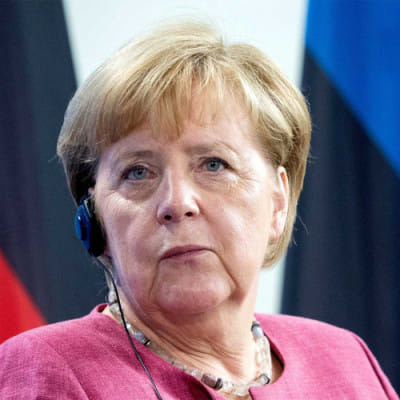Auf Wiedersehen, Chancellor Merkel!

Former German Chancellor Angela Merkel leaves a distinguished—if unavoidably mixed—legacy as she ends a long stint at the helm of Germany, the economic powerhouse of the European Union.
In the rough and tumble of democratic politics, ruling one of the major Western nations for 16 years is no small feat. What makes it more remarkable is that Merkel steered her nation with a calm, steady hand during a particularly turbulent period—when Germany had to deal with a global economic meltdown, a European Union financial crisis, and an exodus of millions of refugees from a war-torn Syria that roiled all of Western Europe.
I have no doubt that analysts are already poring through her record with a fine-tooth comb and making a detailed inventory of her strengths and shortcomings.
There's value in that, but there is also a risk of missing the forest for the trees. Whatever her policy shortcomings may have been, Merkel's lasting contribution was her temperament and style of governance. She brought an unassuming manner, a readiness to compromise and get along, to seek a way towards consensus, with an ideological flexibility that was tempered with pragmatism. To all this, she added a dash of endearing compassion and humanity.
Watching her from the US, where conservatism is a completely different beast, Merkel comes across as a breath of fresh air. I shudder with horror at the time not too long ago when we had a president who was a darling of conservatives (and still is, come to that). I don't think I have to spell out who this former president is. Suffice it to say, the ability to compromise, pragmatism, and modesty are not his strongest suits.
One cannot overstate how important these attributes are for a statesman. Over the past few years, the US has become a petri dish for a real-time experiment on what toxic political hell can descend in the absence of these vital skills of governance. One of the basic facts of politics is that a conciliatory, pragmatic temper soothes political friction and bridges ideological divides.
Here I am, ideologically firmly on the left, yet I feel an enormous respect for a leader whose political views I strongly differ with. I like to call myself a non-denominational leftist: I have little patience for the doctrinaire, dogmatic nostrums of hardcore left-wing ideologues, but I agree with their worldview that societies are monstrously skewed towards serving the uber-rich. My German heroes (this is a dead giveaway of my age) are former Social Democratic chancellors of yesteryear like the cerebral, soft-spoken Helmut Schmidt, or even before that the humane, gentle Nobel Peace laureate Willy Brandt, whose Ostpolitik had gone a long way towards building bridges and lessening tensions with erstwhile Communist East Germany, providing a much-needed salve for the German people so monstrously divided after World War II.
Instead of getting into the nitty-gritty of policymaking during Merkel's long tenure, I will dwell on two issues that stand out.
One is her superb, expert handling of the Covid-19 pandemic. Again, the contrast with the US could not be greater. Merkel's management was an object lesson on how to reassure the public at a time of fear and panic. A trained physicist, she dealt with the crisis with calmness, transparency, and a total commitment to science.
For me, however, Merkel's crowning glory will always be her extraordinary humane response to the Syrian crisis. Millions of Syrians fled a brutal civil war in 2015. As other Western European nations slammed their doors, Germany opened its arms. Between 2015 and 2019, 1.7 million people applied for asylum in Germany, making it the country with the fifth highest population of refugees in the world.
After decades of living in the US, I have an acute awareness of how people in developed countries are seized with a primal panic at the influx of destitute refugees. Xenophobia overwhelms compassion. Politically, the most anti-immigrant section of the population gravitates towards conservative politicians, some of whom are happy to fan the flames, while others duck the issue.
A real test of a politician's moral fibre is when she or he continues to take a stand even if it puts her or his political future in jeopardy. Merkel passed it with flying colours. She did not care that her stand could—and eventually did—carry a steep political price tag.
To be sure, Merkel has her critics. Many analysts say she was a crisis manager and not a visionary. While she arguably helped save the Eurozone following the debt crisis triggered in 2009, many nations bristled at Germany's brutal austerity measures. Other critics accuse her of complacency in the face of growing authoritarianism in Eastern Europe. Nonetheless, for 16 years, Merkel ran Germany with such level-headed calm and pragmatism that her stature grew in the world. She towered in her region, often being called the Queen of Europe.
Merkel's success in governance and diplomacy, in contrast with the bitter ideological bickering in the US, reminds me of one of Aesop's fables. The wind and the sun were arguing about who could get a man to take off his coat. The arrogant wind went first. It huffed and puffed, but the man held to his coat even more tightly. Then the sun took over. It offered its warmth. The man basked in the sun. He relaxed and took off his coat.
While serious political divides can never be fully reconciled, the art of gentle persuasion can go a long way towards creating a workable space for governance. Dogmatism, grandstanding and braggadocio fall short. Merkel is a living example of that lesson.
Auf wiedersehen, Angela Merkel. In this age of bitter political schisms, your legacy will always remind us that there is a far better way.
Ashfaque Swapan is a writer and editor based in Atlanta, US.

 For all latest news, follow The Daily Star's Google News channel.
For all latest news, follow The Daily Star's Google News channel. 



Comments